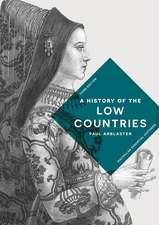Croatia: A History from the Middle Ages to the Present Day
Autor Marcus Tanneren Limba Engleză Paperback – 25 iun 2019
In this updated edition of his acclaimed history, Marcus Tanner takes us from the first Croat principalities of the Early Middle Ages through to the country’s independence in the modern era
“Full of absorbing stories and important insights, Croatia deserves to be read.”—Aleska Djilas, New York Times Book Review
“A lucid, expert account of Croatia’s past at the bloody crossroads of big-power ambitions—Turks, Austrians, Italians, Russians—leads smoothly into a riveting close-up view of the 1990s fight for independence.” Boyd Tonkin, The Independent
“Full of absorbing stories and important insights, Croatia deserves to be read.”—Aleska Djilas, New York Times Book Review
“A lucid, expert account of Croatia’s past at the bloody crossroads of big-power ambitions—Turks, Austrians, Italians, Russians—leads smoothly into a riveting close-up view of the 1990s fight for independence.” Boyd Tonkin, The Independent
Preț: 109.24 lei
Nou
Puncte Express: 164
Preț estimativ în valută:
20.91€ • 22.72$ • 17.58£
20.91€ • 22.72$ • 17.58£
Carte disponibilă
Livrare economică 31 martie-14 aprilie
Livrare express 15-21 martie pentru 23.84 lei
Preluare comenzi: 021 569.72.76
Specificații
ISBN-13: 9780300246575
ISBN-10: 0300246579
Pagini: 392
Ilustrații: 32 b-w illus.
Dimensiuni: 127 x 197 x 31 mm
Greutate: 0.36 kg
Ediția:Fourth Edition
Editura: Yale University Press
Colecția Yale University Press
ISBN-10: 0300246579
Pagini: 392
Ilustrații: 32 b-w illus.
Dimensiuni: 127 x 197 x 31 mm
Greutate: 0.36 kg
Ediția:Fourth Edition
Editura: Yale University Press
Colecția Yale University Press
Recenzii
“Written with vigor, full of absorbing stories and important insights, Croatia deserves to be read.” —New York Times
"Croatia has often but not always been at war. After the Habsburgs historic victory over the Turks in the 1690s, northern Croatia enjoyed the benefits of peace and orderly government with few interruptions until the First World War. The 20th century has undone those gains. The last three generations have known warfare on a scale not seen since the Middle Ages. After the carnage of the First World War, followed the disastrous 'Independent State of Croatia' in 1941, a poisoned chalice, tainted with a Fascist ideology and an alliance with Hitler's Germany. The result was to plunge Croatia into civil war between left-wing Partisans and the Fascist Ustashe. And, after emerging into independent statehood once again in the 1990s, the Croats have continued to be dogged by the legacy of the past. The fighting of the 1940s and the mass killings of Croatia's Serb community came back to haunt the country 50 years on."—From the preface
"Croatia has often but not always been at war. After the Habsburgs historic victory over the Turks in the 1690s, northern Croatia enjoyed the benefits of peace and orderly government with few interruptions until the First World War. The 20th century has undone those gains. The last three generations have known warfare on a scale not seen since the Middle Ages. After the carnage of the First World War, followed the disastrous 'Independent State of Croatia' in 1941, a poisoned chalice, tainted with a Fascist ideology and an alliance with Hitler's Germany. The result was to plunge Croatia into civil war between left-wing Partisans and the Fascist Ustashe. And, after emerging into independent statehood once again in the 1990s, the Croats have continued to be dogged by the legacy of the past. The fighting of the 1940s and the mass killings of Croatia's Serb community came back to haunt the country 50 years on."—From the preface
"Croatia has often but not always been at war. After the Habsburgs historic victory over the Turks in the 1690s, northern Croatia enjoyed the benefits of peace and orderly government with few interruptions until the First World War. The 20th century has undone those gains. The last three generations have known warfare on a scale not seen since the Middle Ages. After the carnage of the First World War, followed the disastrous 'Independent State of Croatia' in 1941, a poisoned chalice, tainted with a Fascist ideology and an alliance with Hitler's Germany. The result was to plunge Croatia into civil war between left-wing Partisans and the Fascist Ustashe. And, after emerging into independent statehood once again in the 1990s, the Croats have continued to be dogged by the legacy of the past. The fighting of the 1940s and the mass killings of Croatia's Serb community came back to haunt the country 50 years on."—From the preface
"Croatia has often but not always been at war. After the Habsburgs historic victory over the Turks in the 1690s, northern Croatia enjoyed the benefits of peace and orderly government with few interruptions until the First World War. The 20th century has undone those gains. The last three generations have known warfare on a scale not seen since the Middle Ages. After the carnage of the First World War, followed the disastrous 'Independent State of Croatia' in 1941, a poisoned chalice, tainted with a Fascist ideology and an alliance with Hitler's Germany. The result was to plunge Croatia into civil war between left-wing Partisans and the Fascist Ustashe. And, after emerging into independent statehood once again in the 1990s, the Croats have continued to be dogged by the legacy of the past. The fighting of the 1940s and the mass killings of Croatia's Serb community came back to haunt the country 50 years on."—From the preface
Notă biografică
Marcus Tanner is a London-based writer, journalist, editor, and commentator, specializing in Eastern and Central Europe, the Balkans, and Celtic countries.




